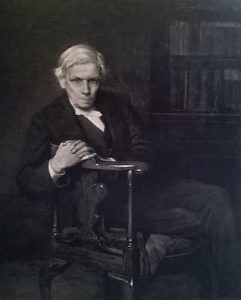Alfred Ainger
 AINGER, ALFRED (1837-1904), English divine and man of letters, was born in London on the 9th of February 1837, the son of an architect. He was educated at King’s College, London, and at Trinity College, Cambridge, and was ordained in 1860 to a curacy at Alrewas, near Rugeley. There he remained until 1864, when he became an assistant master at the Sheffield Collegiate School. His connection with the Temple church, in London, began in 1866, when he was appointed reader; and in 1894 he succeeded Dr Vaughan as master. In 1887 he was presented to a canonry in Bristol cathedral, and he was chaplain-in-ordinary to Queen Victoria and King Edward VII. He died on the 8th of February 1904.
AINGER, ALFRED (1837-1904), English divine and man of letters, was born in London on the 9th of February 1837, the son of an architect. He was educated at King’s College, London, and at Trinity College, Cambridge, and was ordained in 1860 to a curacy at Alrewas, near Rugeley. There he remained until 1864, when he became an assistant master at the Sheffield Collegiate School. His connection with the Temple church, in London, began in 1866, when he was appointed reader; and in 1894 he succeeded Dr Vaughan as master. In 1887 he was presented to a canonry in Bristol cathedral, and he was chaplain-in-ordinary to Queen Victoria and King Edward VII. He died on the 8th of February 1904.
Canon Ainger’s gentle wit and humor, his generosity and lovable disposition, endeared him to a wide circle. In literature his name is chiefly associated with his sympathetic appreciation of Charles Lamb and Thomas Hood. His works include: Charles Lamb (1882) and Crabbe (1903) in the “English Men of Letters” series; editions of Lamb’s Essays of Elia (1883) and of his Letters (1888; 2nd ed., 1904), of the Poems (1897) of Thomas Hood, with a biographical introduction; The Life and Works of Charles Lamb (12 vols., 1899-1900), articles on Tennyson and Du Maurier in the Dictionary of National Biography; The Gospel and Human Life (1904), sermons; Lectures and Essays (2 vols., 1905), edited by the Rev. H. C. Beeching.
See also Edith Sichel, The Life and Letters of Canon Ainger (1906).
